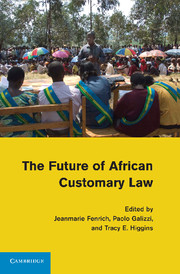Book contents
- Frontmatter
- Contents
- Notes on Contributors
- Acknowledgments
- Introduction
- Part One The Nature and Future of Customary Law
- Part Two Ascertainment, Application, and Codification of Customary Law
- Part Three The Role and Power of Traditional Authorities
- Part Four Customary Land, Property Rights, and Succession
- Part Five Customary Criminal Law
- Part Six Customary Law, Human Rights, and Gender Equality
- 18 Customary Law, Gender Equality, and the Family
- 19 African Customary Law and Women’s Human Rights in Uganda
- 20 Women’s Rights, Customary Law, and the Promise of the Protocol on the Rights of Women in Africa
- 21 From Contemporary African Customary Laws to Indigenous African Law
- Index
- References
19 - African Customary Law and Women’s Human Rights in Uganda
Published online by Cambridge University Press: 05 February 2012
- Frontmatter
- Contents
- Notes on Contributors
- Acknowledgments
- Introduction
- Part One The Nature and Future of Customary Law
- Part Two Ascertainment, Application, and Codification of Customary Law
- Part Three The Role and Power of Traditional Authorities
- Part Four Customary Land, Property Rights, and Succession
- Part Five Customary Criminal Law
- Part Six Customary Law, Human Rights, and Gender Equality
- 18 Customary Law, Gender Equality, and the Family
- 19 African Customary Law and Women’s Human Rights in Uganda
- 20 Women’s Rights, Customary Law, and the Promise of the Protocol on the Rights of Women in Africa
- 21 From Contemporary African Customary Laws to Indigenous African Law
- Index
- References
Summary
Introduction
One of the major achievements in the development of human rights has been the recognition that women’s rights are human rights and that issues of gender equality should form an integral part of international relations. It is now recognized that women’s human rights are inalienable and an indivisible part of universal human rights, which includes the right to full and equal participation with men in the political, civil, economic, social, and cultural life at all levels. The Convention on the Elimination of all Forms of Discrimination against Women (the Women’s Convention) covers women’s human rights in all aspects of their lives. At the regional level, the Protocol to the African Charter on Human and Peoples’ Rights on the Rights of Women in Africa pays special attention to women’s human rights in Africa. These international and regional instruments, to which Uganda is a party, provide a framework for the elimination of gender-based discrimination generally and the protection of women’s right to equality in particular.
- Type
- Chapter
- Information
- The Future of African Customary Law , pp. 446 - 466Publisher: Cambridge University PressPrint publication year: 2011
References
- 2
- Cited by

